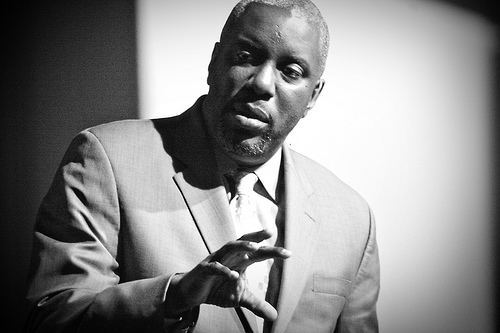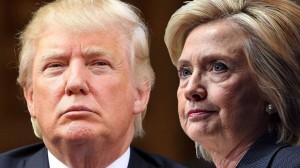Those who fondly remember the days when the Gospel Coalition site could generate significant controversies in the evangelical world can cheer themselves by reading Thabiti Anyabwile’s latest posts. Pastor Anyabwile, who has always struck me as one of the wisest voices on the Gospel Coalition site, is patiently enduring fire from fragments religious right because he is encouraging evangelicals to vote for Hillary Clinton.
It is not that Anyabwile has any great love for Clinton’s platform – quite the opposite in fact:
Hillary Clinton’s position on abortion, along with the official position of the Democratic Party, is an unquestionably evil policy. Her 80s-era comments calling young African American boys and men “super predators” was an ugly example of race-baiting in support of an utterly destructive criminalization of my people and my community. Her back-pedaling in recent months is hardly sufficient. Clinton’s penchant for bending the truth beyond recognition is more than standard fare in political races; it’s repeated breaking of God’s command not to lie or bear false witness.
Rather, Anyabwile believes that when Christians vote, they ought to vote to stop Trump, because:
He’s no pro-life champion and has even been a contributor to the Clintons. He’s argued for Japan and Saudi Arabia to have nuclear weapons. That’s not only bizarre, it’s also potentially genocidal. Mr. Trump talks freely about registering Muslims, encroaching on a basic civil and religious liberty. His explicitly racist comments about Mexicans and others is no small sin. His comments about women are not only impolite but are themselves an evil affront to the image of God in our sisters. I don’t want my country to become again a place where open hatred is championed at the highest levels as I fear they are with Mr. Trump.
 Anyabwile’s reasoning seems clear enough: he believes that a Trump victory could see America fracture along racial lines. Hilary may not be pro-life, but neither is “the Donald”. Anyabwile does not trust Trump to enact, or even support, pro-life policies. Nuclear proliferation is hardly consistent with a pro-life philosophy. Racism is not only corrupting but leads, directly and indirectly, to a loss of life. So Pastor Anyabwile feels duty bound to vote against Mr Trump. It may worth debating whether or not Anyabwile’s case is airtight; but it seems rational, and I do not understand why some have treated his articles as if they were sinful or heretical.
Anyabwile’s reasoning seems clear enough: he believes that a Trump victory could see America fracture along racial lines. Hilary may not be pro-life, but neither is “the Donald”. Anyabwile does not trust Trump to enact, or even support, pro-life policies. Nuclear proliferation is hardly consistent with a pro-life philosophy. Racism is not only corrupting but leads, directly and indirectly, to a loss of life. So Pastor Anyabwile feels duty bound to vote against Mr Trump. It may worth debating whether or not Anyabwile’s case is airtight; but it seems rational, and I do not understand why some have treated his articles as if they were sinful or heretical.
But I’m Northern Irish, I have no dog in this particular fight and my understanding of America’s political culture is limited. And while we defend the sanctity of life and marriage at Saints and Sceptics, we also believe that Christians should have liberty of conscience on most social, political and economic issues. So, to be clear, I would never dream of telling my immediate neighbours who to vote for in local elections, never mind poking my nose into US politics. But the reaction to Pastor Anyabwile’s article suggests that there are a few issues that are worth teasing out here.
The first is to note that the nomination of Trump inflicted a horrible shock on evangelicalism. From the 1980s onwards, we have been led to believe that evangelicals formed part of a moral majority in the United States of America. Evangelicalism had some political clout in the US and could act as a formidable rear-guard against the advance of secularism.But if such a rear-guard ever existed, it was overwhelmed and annihilated in recent debates over marriage and sexual morality. Then the nomination of Trump nailed down the coffin.
 Most committed evangelicals rejected Trump; their leaders fought against his nomination. They quite correctly discerned that the Donald’s philosophy is profoundly anti-Christian. Ross Douthat points out that Trump is :
Most committed evangelicals rejected Trump; their leaders fought against his nomination. They quite correctly discerned that the Donald’s philosophy is profoundly anti-Christian. Ross Douthat points out that Trump is :
…. a proud flouter of the entire Judeo-Christian code — a boastful adulterer and a habitual liar, a materialist and a sensualist, a greedy camel without even the slightest interest in squeezing through the needle’s eye.
Yet evangelical opposition failed to stop the rise of Trumpism. In fact, while active churchgoers tended to reject Trump, those who merely affiliated with evangelical churches tended to support him. Evangelical leaders could not sway over voters who were sympathetic to evangelicalism; evangelicalism’s spokespersons seemed exposed, impotent and isolated. Powerless in the GOP and despised by Democratic intelligentsia, evangelicals have discovered that the moral majority was a myth; in the West we can only form a weak, vulnerable and unpopular minority.
Second, we might wonder if we have no-one but ourselves to blame. Douthat points out that many churches have a theology which is “nationalistic, prosperity-worshiping, by turns apocalyptic and success-obsessed.” That is a fair observation, but I would argue that the problem is much deeper than that. The evils of nationalism, sectarianism, racism, egoism and materialism need robust and profound responses. Yet many of our churches are incapable of mounting such a challenge.
From the 1990s onwards, managerial and promotional techniques rapidly replaced mature preaching and theological depth. The gospel was sliced down to easily digestible portions; the nutritional value of the church’s message neglected in favour of more appetising nuggets with mass appeal. Chuck Colson prophetically warned of the McDonaldisation of Christianity – what we might call the ‘McChurch’ .
Of course such methods lead to rapid growth; lack of depth is a powerful selling point in our culture. Simply look at the rise of “the Donald”. Feelings are central to Trumpism; arguments are peripheral. His speeches and rallies have no time for complexities, for once careful thought enters the equation the product ceases to be fun. Trump seeks to create confidence and certitude in his followers without requiring them to make the appropriate mental or emotional effort.
So many of our churches are pale imitations of a Trump rally. There are passionate speeches with entertaining music, and while the proceedings often seem odd to outsiders, the participants do seem to be enjoying themselves. But no-one thinks; no demands are made and no-one is challenged. Jettisoning tradition and theology made us more marketable, it also made us too light, too insubstantial to be taken seriously. Having lost our connection with the saints of the past, we lost our depth.
If we valued faith, humility and repentance we would seek wisdom. The church cannot reason with unbelief because it does not reason about what it has always believed. And we cannot built bridges to the secular world because we are too focused on rebuilding our subcultures in more entertaining forms. But too many churches seem to have nothing to say, offering little more than an identity and a set of positive experiences. Little wonder, then, that evangelicals could not stop the Trump.

